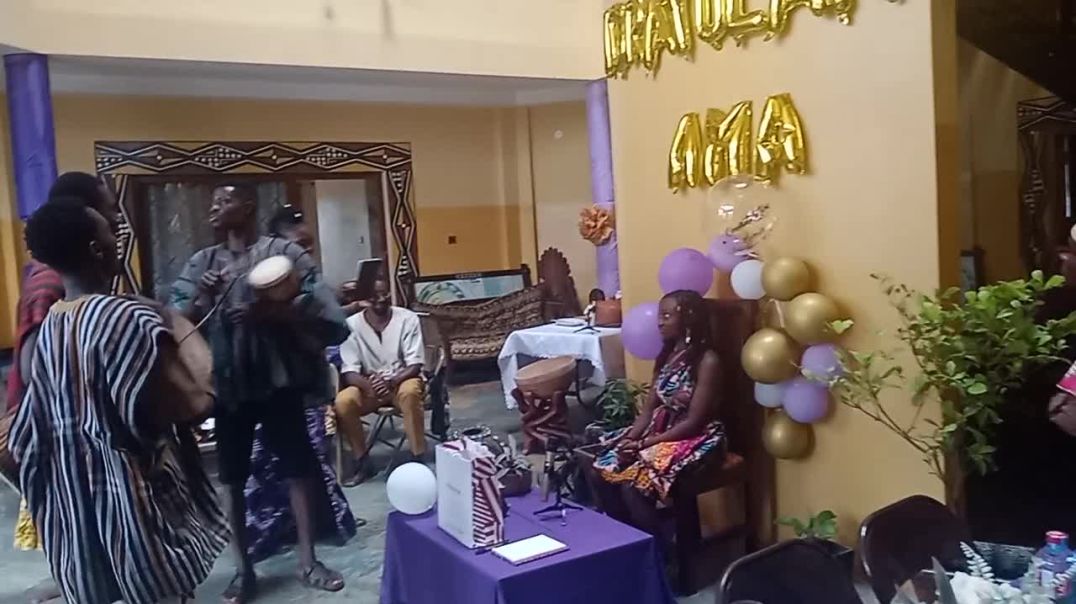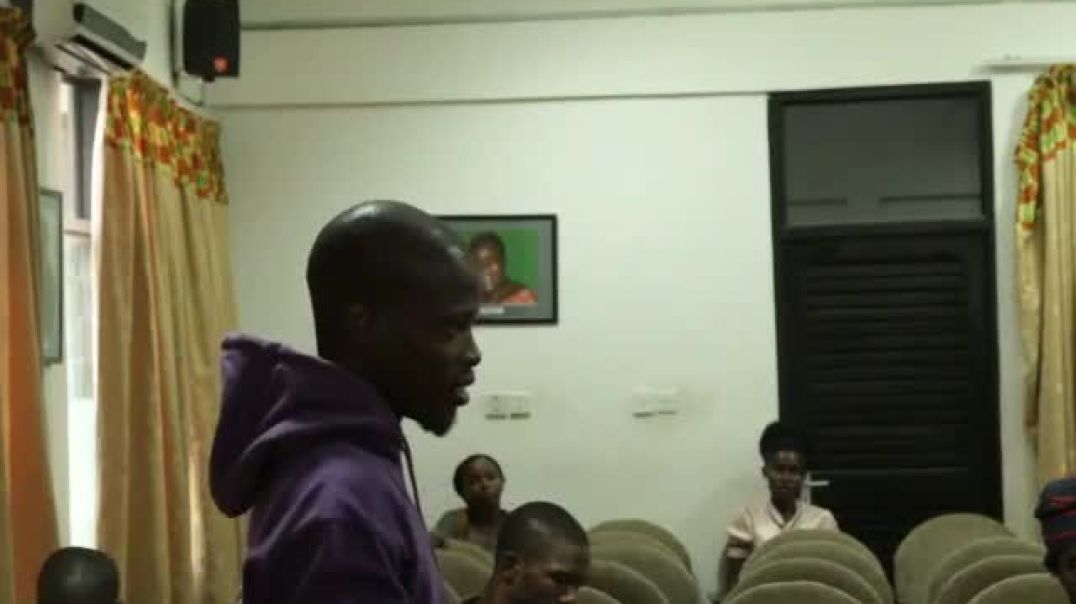Top videos
Label: BHM (Brobisco House Of Music) – KBL 131
Format: Vinyl, LP
Country: Ghana
Released: 1981
Genre: Folk, World, & Country
Style: Highlife
You can always visit our website : https://www.afrosunny.com/ for more African music.
Tracklist
A Mene Wo Asetena (Medley)
B Bo Me Dua Ma Menwu
Phonographic Copyright ℗ – Brobisco
Manufactured By – Ambassador Records Manufacturing Co. [A.R.M.C.]
Made By – Record Manufacturers (Ghana) Ltd. [R.M.G.L.]
Recorded At – Ghana Films Studios Accra
Design – E. E. Lamptey
Engineer – A. Acher, F. Kwakye
Lead Vocals – Alex Konadu
Producer – A. K. Brobbey
* All materials presented on this channel are copyrighted by their respective copyright owners, and are subject to use for INFORMATIONAL PURPOSES ONLY! SUPPORT THE MUSICIANS, BUY THEIR MUSIC!** If you (being a musician or a copyright owner) don't approve your music material to be presented on this channel (or would like any additional info to be published), please contact me (via my Youtube channel ) and I'll remove it in seconds (or add necessary info)!Thank you in advance for your understanding!
Africa is rising — and Captain Ibrahim Traoré may be the face of its revolution. In a historic wave of unity, African leaders and citizens across multiple countries are voicing support for Traoré as a potential president of a united Africa.From powerful speeches to bold anti-imperialist moves, Traoré has ignited a fire that’s spreading across the continent. Could this be the beginning of a Pan-African political movement?In this video, we break down: The explosive rise of Traoré’s influence How African leaders are rallying together The grassroots demand for continental unity What this means for Africa’s future on the global stage
"In this video, we break down the new Code of Conduct introduced by John Dramani Mahama for political appointees. Discover what it means for accountability, governance, and the future of leadership in Ghana.
Meeting President of Burkina Faso, Ibrahim Traore
Ama's graduation celebration part 1
How Abibifoɔ in Abibiman Became Malnourished
This is a clip from the "Yacouba Sawadogo: The Man Who Stopped the Desert" post film discussion - https://abibitumitv.com/v/rqKn3m
Since he was a young boy, Manuel Henrique, son of Joao Grosso and Maria Haifa, learned the secrets of capoeira in the street, with Mestre Alipio, in Santa Amaro da Purificaçao. He was "baptized" into capoeira with the name "Besouro Mangangá", (a large and dark species of maybug), for his flexibility and the ability to disappear when the time called for it. Strong, black and with an adventurous spirit, he never worked in one place steadily nor had a definitive profession. When the adversities were heavy and the advantage of the fight was with the opponent, Besouro would disappear "flying" without a trace. The belief that he had supernatural powers began to grow.
By train, by horse or on foot, depending on the circumstances, Besouro traveled from Santo Amaro to Maracangalha or vice versa, working on plantations, farms or mills.
Mestre Cobrinha Verde, Besouro's cousin and capoeira student tells a story about him. One day unemployed, Besouro went to Colonia Mill (now called Santa Elizia), in Santa Amaro to look for work. He was authorized to work and became an employee there. One week later, on payday, the boss told all of the employees, that the work contract was "quebrado para São Caetano" (closed or broken for Saint Caetano). This saying was used during this time period to say that no one was going to get paid. Those who dared to challenge the boss were tied to a trunk of a tree, whipped and left there for 24 hours, but with Besouro, it was different. When the boss told him he would not pay him, Besouro grabbed him by the shirt and violently forced him to pay the money he owed him.
Besouro was a revolutionary. He didn't like the police and was always involved in complications with them. More than once he used physical force to disarm policemen. Once armed with their guns, he would use them to lock the policemen up in jail cells meant for criminals.
One time, in Largo de Santa, one of the main squares of Santo Amaro, Besouro forced a soldier to drink such a large quantity of alcohol that he passed out on the ground. When the soldier woke up, he went to his commander, Capitan José Costal, who assigned 10 men to catch Besouro dead or alive. Besouro, hanging out in a local bar, had an intuition that the police were coming. He left the bar and went to the main square. When the police arrived, he walked up to the Christian cross that was in the square. He proceeded to spread his arms out like Jesus Christ and told the police he would not surrender to them. Violent shots were heard and the capoeirista fell to the ground. Capitan José Costa walked up to him and probed him with his gun, thinking the was dead. Besouro, who was very much alive, to the great surprise of the Captain, grabbed his rifle from him. He then ordered all the policemen to put down their guns and leave the square. They left unarmed and to the tune of Besouro singing a cheerful song.
Besouro's fights and revolts were successive and much of the time, he was in opposition with the police and owners of the farms and mill. While Besouro was working on Dr. Zeca's plantation, the father of a young man called Memeu, he was marked to die.
Dr. Zeca was an influential man, who wanted Besouro dead. He ordered Besouro, who didn't know how to read or write, to deliver a piece of mail to the administrator of Maracancalha mill, a friend of his. The piece of mail said, "Kill the man who is delivering this letter." Dr. Zeca's friend said very calmly to Besouro that he would stay the night and return to Dr. Zeca's with a response the following day. Early the next morning Besouro went to look for the man and was surrounded by a group of about 40 soldiers. They shot at him with a violent round of bullets. The capoeirista began to escape, dodging bullets by moving his body to the rhythm of the guns. At this moment, a man arrived called, Eusebio de Quisaba, who violently stabbed Besouro with a knife made out of a special wood called "turcum". This wooden knife has significance in the African tradition of Candomblé. Candomblé is a strong, religious tradition that was established in all Latin countries where there was commercial slave trade of Africans. The folklore says that this wood is the only way to kill a man whose body and spirit are "closed" to death. This idea that a person is unable to die was a characteristic associated with Besouro; a man that no bullet could enter.
Manuel Henrique, Besouro Mangangá, died in 1924, at the young age of 27, but lived on in two of his capoeira students Rafael Alves Franca, Mestre Cobrinha Verde and Siri de Mangue.
Today Besouro is a capoeira symbol throughout all of Bahia. He is well known for his bravery and loyalty. The support he gave to those who were persecuted and oppressed by the police and owners of plantations was not forgotten.
Bennu Center Launch and Tribute to Nana Abibifahodie Baba Kamau Kambon
Abibitumi Abibifahodie Film Festival is here to center Black voices, Black stories, and Black visions on our own terms. This Super Trailer gives you a powerful glimpse into a global gathering of Abibifoɔ—filmmakers, thinkers, warriors, healers, and creatives—who are using cinema as a weapon for Abibitum (Black Power) and Abibifahodie (Black Liberation).From hard-hitting documentaries to mind-expanding animation, from intimate personal journeys to sweeping historical epics, the Abibitumi Abibifahodie Film Festival brings together work from across Abibiman and the Diaspora. These films confront anti-Black warfare in all its forms while celebrating our genius, our languages, our cultures, our families, and our unbreakable determination to reclaim our story.👉 Learn more, submit your film, and secure your festival access at:https://filmfestival.abibifahodie.orgIf you believe that images shape reality, that stories can train a people for total liberation, and that Black cinema must answer to Black people first and foremost, then this festival is for you. Watch the Super Trailer, share it with your network, and join us in building the global Abibitumi Abibifahodie Film Festival into a powerhouse for unapologetically Black film.Visit: https://filmfestival.abibifahodie.org#Abibitumi #abibifahodie #filmfestival #blackcinema #abibiman #rekemetization #blackpower #blackliberation
Lesson in Nature - are you operating as a "zombie bodyguard" for those who implanted their names, languages, religions, worldview on you - while it destroys you from the inside out?
Wasp larvae on a caterpillar is a classic example of parasitoidism, where tiny parasitic wasps lay eggs inside or on a caterpillar, the larvae hatch and eat the caterpillar from within (often avoiding vital organs to keep the host alive), eventually emerge, and spin cocoons, sometimes while the caterpillar acts as a "zombie bodyguard" for them.










